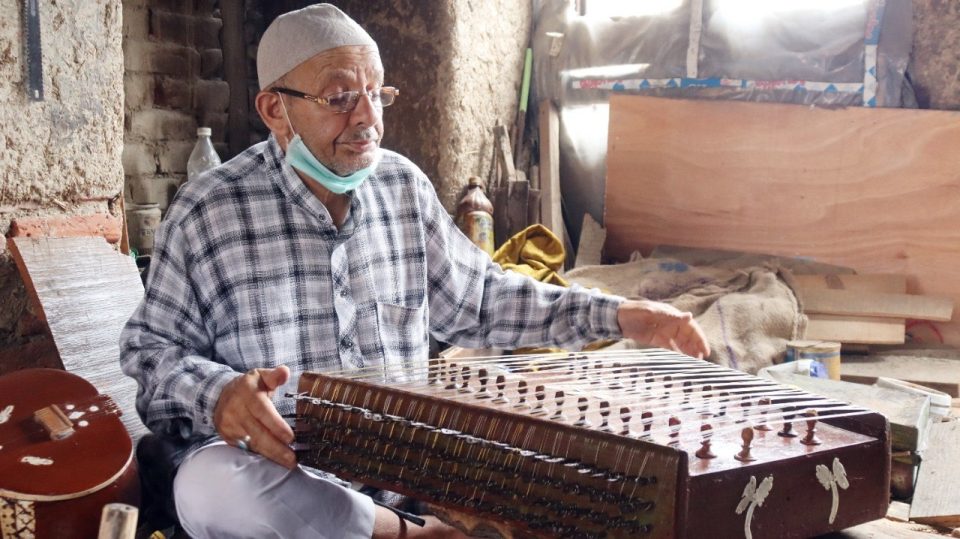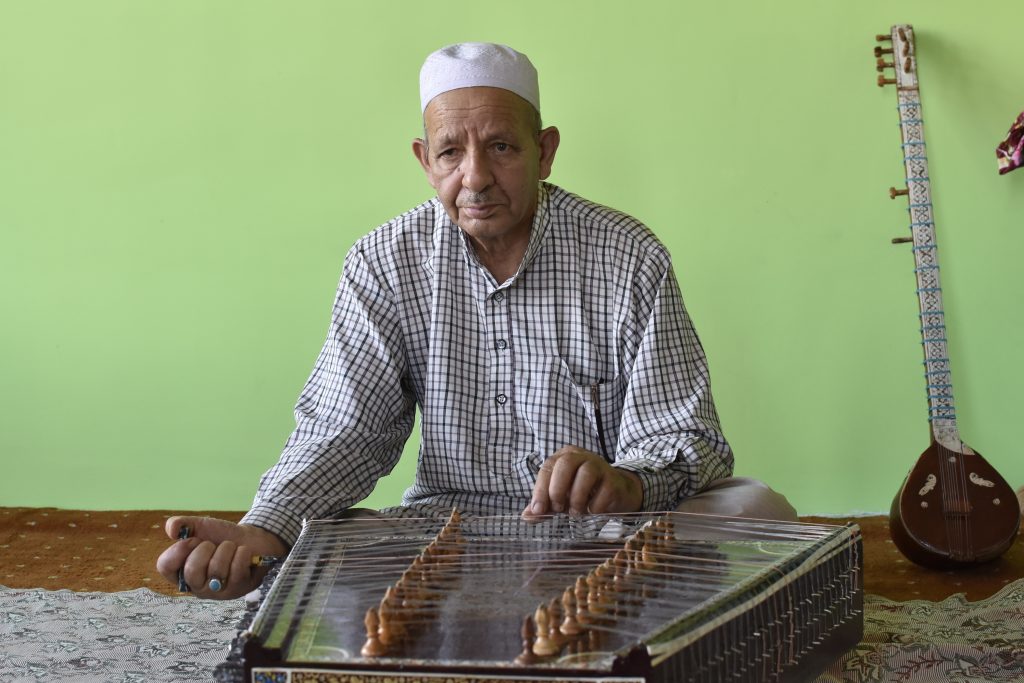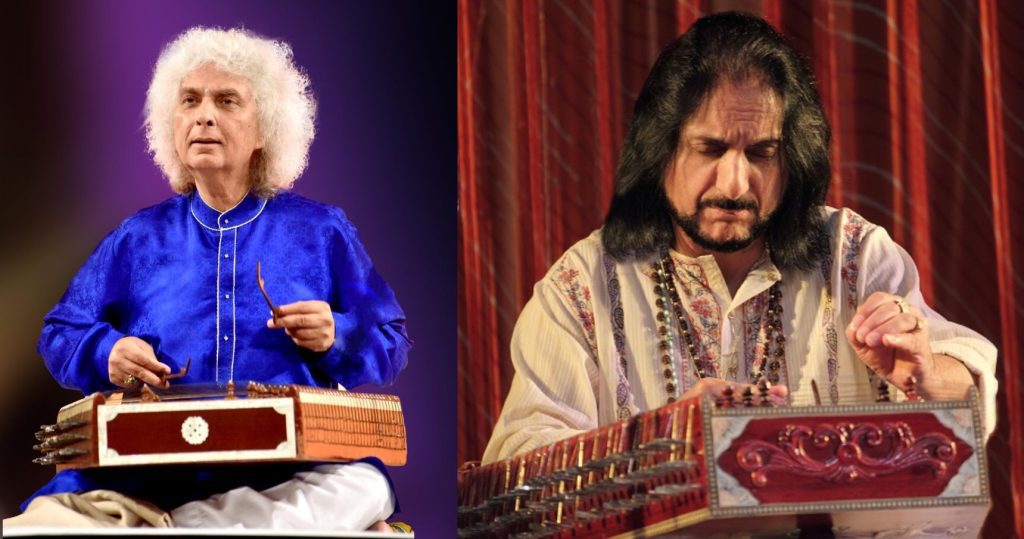
Kashmir’s last santoor-maker reflects on his legacy, as it withers away

Ghulam Mohammad Zaz, an octogenarian, fumbles with strings and pegs in a run-down room on the banks of the river Jehlum in Srinagar (Kashmir). His fidgeting occasionally breaks the eerie silence that permeates the old mud walls and the debris that covers his second-floor house in a heritage building at Zaina Kadal in downtown Srinagar.
The elderly’s geriatric face and withered fingers are illuminated by the sunlight that enters through a small window as they trace the rough contours of an unfinished santoor, a trapezoid-shaped hammered dulcimer; generally made of walnut, the instrument has a total of 100 strings.
The last craftsman
Zaz has been breathing life into them for over seven decades ever since he learnt the craft at the age of 12. He had fallen ill and could not complete his education. His parents decided he should learn the craft that ran in the family. Though it was just happenstance that led Zaz to santoor-making, he eventually mastered it. Today, Zaz, whose surname rhymes with saaz — the Urdu word for musical instrument — is known as the ‘melody maker’ from Kashmir.
Crafting santoor was bequeathed to Zaz by his ancestors. He learnt the fine art of making the stringed instrument from his grandfather and father, who had been doing it for seven generations. His ancestors’ heritage has now run its course, making him the eighth generation and, inevitably, the last. Zaz has three daughters, but they all have chosen other careers. He, therefore, believes that the artistic channel cultivated for several decades may probably soon vanish into oblivion.

Fadeaway destined?
Zaz believes that his talent and legacy are on the verge of obsolescence not due to fate, but because it was divinely destined. He claims that Sufi saints (peers and fakirs) had made the decision to halt his family’s lineage long ago by telling his forefathers that only seven generations would acquire the craft.
Along with the Kashmiri santoor, Zaz’s family was renowned for producing rabab (lute-like instrument), Kashmiri sitar, and sarangi. “My elders (forefathers) are Sone Joo Zaz and Khaliq Joo Zaz. They are our teachers. Today, such talented musicians are hard to find. So are famous clients like Pandit Bhajan Sopori and Pandit Shiv Kumar Sharma, who introduced the Kashmiri santoor to a global audience. They valued art,” says Zaz.
Also read: Bhat’s killing in Shopian makes Kashmiri Pandits jittery about their safety in the Valley
Srinagar-born Sopori and Jammu-born Sharma, the santoor maestros, passed away earlier this year. Sharma had won numerous national and international honours, including the Padma Shri and Padma Vibhushan. Sopori was a Padma Shri awardee, and a recipient of J&K State lifetime achievement award.
Best in the business
According to prominent Kashmiri santoor player Ustad Mohammad Yaqoob Sheikh, 62, the Zaz family is without doubt the best in the art of santoor making. “I received a santoor as a gift made by the Zaz family which my grandfather used to play. It is about 70 years old. Until 2020, I played santoor at Radio Station Kashmir; it is 60 years old and still in excellent condition. This is a testimony to their authenticity and credibility as well as their zest in the art of santoor-making,” says Sheikh.
The legacy of Zaz’s family with regard to the making of rabab, sarangi, and santoor has been unparalleled. Sheikh says that while the current generation no longer shows much interest in traditional instruments, even those who do learn to play them eventually choose to abandon it due to the lack of opportunities. “There was a time when musicians across India used to visit the Valley just to get their instruments from the Zaz family. Such was the level of their expertise,” says Sheikh.
Underlining Zaz’s contributions, Abhay Sopori, son of Pandit Bhajan Sopori, says: “My father used to play the santoor made by Zaz, and he was the last member of his family to have that skill.” According to Noor Mohammad, popularly known as ‘Sahil Santoor,’ a young Kashmiri santoor player and an avid performer, says that the Zaz family manufactures extraordinary instruments that produce high-quality music. “They create instruments that produce calming music that is distinct from other santoors. These instruments last for years,” Sahil says.
Zaz claims that his family’s Kashmiri santoor has lasted more than a century. Sahil carries two santoors, one of which is a nearly 40-year-old Zaz family creation. It was given to him by his instructor, Master Mohammad Ismail Bhat. And it is still in perfect condition.
Also read: India slams Pakistan after it rakes up Kashmir issue during UNGA emergency
A ‘mystical’ instrument
The santoor arrived in Kashmir from Central Asia, especially from Iran, prominent Kashmiri scholar and writer Zareef Ahmad informs. The Kashmiri santoor is thought to be an important element for Sufi music, which was originally only performed in Persian, but subsequently also featured Kashmiri and Urdu.
“The santoor is regarded as an important component of the classical Sufi ensemble music of Kashmir, featuring traditional folk,” says Zareef. Sufism is a mystical way of life in Islamic culture. Zaz’s family has a long history; they were the only ones in Kashmir to produce several musical instruments, including the santoor, he says.
Zaz says that the type of wood required to make santoor is not readily accessible in the market these days. “The wood used in the manufacturing of traditional Kashmiri santoor is hard to get. A particular kind of wood is required to make santoor; it should have the tone quality and should be soundproof. It should be finished after a protracted seasoning process to prevent insect damage,” he says.

The traditional santoor of Kashmir is mostly used in Sufiana Mausiqi. It comprises a trapezium-shaped box, particularly made of seasoned rare wood with a hollow inside, serving as a resonator. The strings are laid over the shaft, controlled by tuning keys on the side of the instrument. The instrument is placed on a small triangular stand called the Sehpai, with the sound of the notes being produced with a striker called Kalam.
The instrument holds a very special place in his heart, says Zaz. “Santoors are extremely valuable to both musicians and the music business. I consider my family and myself to be extremely lucky for having been able to support this profession with our tools. I struggle to imagine what my life would be like if I didn’t work on the santoor,” he adds.
Sufi-inspired music, commonly referred to as “Kashmiri Sufiana Mausiqi,” is a traditional musical form of Kashmir that has evolved over time and played a significant role in the local culture. It is connected with regional rituals and mysticism.
Watch: Srinagar grooves to folk music, connects with heritage
The withering legacy
Over the years, the Zaz family has grown accustomed to being recognised for their contributions to Sufiana music. Zaz recalls it with pride: “It was another time, so different from today.”
He recollects how people from far and wide have admired his family for the art that it has nurtured. “We received excellent compensation for our work and were treated as good artistes. Today’s youth, however, prefer a different genre of music. They have little interest in traditional music, which has been a part of our culture for many years,” he says.
Zaz believes that the younger generation’s lack of interest in Kashmiri musical instruments is the cause of their decline since they tend to prefer “modern trends” and new musical instruments. For Zaz, making these instruments has more to do with the divine than with money. “Absolute focus is necessary for both comprehending and producing each sound. Only when both your heart and head are engaged that an instrument can create a sound that can touch a million hearts,” says Zaz.
Zaz claims he has never considered changing his line of work. His family has always been able to survive solely relying on his ancestor’s craft. “This legacy has always helped me meet my needs, from constructing a home to funding my daughters’ schooling and marriage,” he says.
Zaz vows to continue with his craft until the end of his life. His fingers may fumble, but his resolve is steadfast. “I hold the craft in the highest regard,” he proudly declares. With hip hop, rap and electronic dominating the musical scene, the craft of santoor making is dying a slow death, laments Zaz, as he resumes work on the unfinished santoor.


